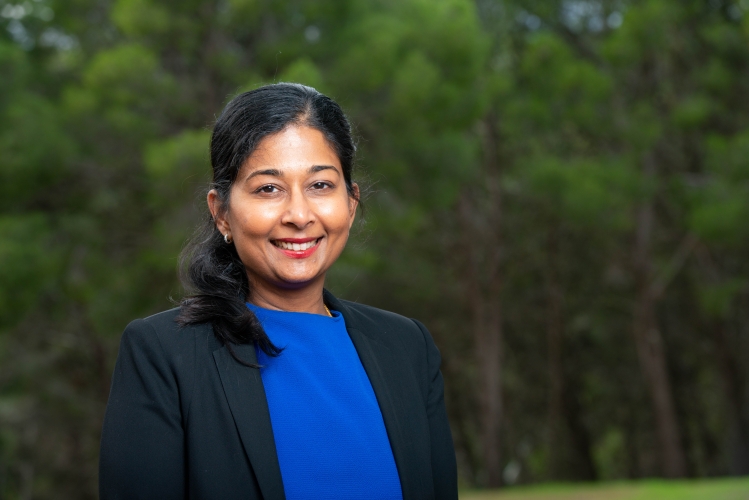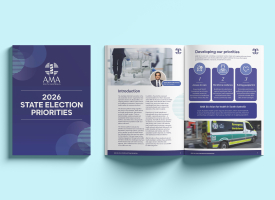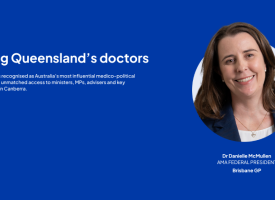Transcript: ABC Radio Adelaide - Women's Health Week
During Women’s Health Week, AMA SA Councillor Dr Jayanthi Jayakaran told ABC Radio Adelaide that when female doctors are proportionately represented at all levels of the workforce, the health system is stronger and patients receive better care.

Transcript: AMA SA Councillor Dr Jayanthi Jayakaran on ABC Radio Mornings with Rory McClaren.
(2 September, 2025)
Subjects: women's health, women in medicine, leadership, endometriosis, menopause, primary care, equity
Rory McClaren: This week is not only the start of spring, but it is also Women's Health Week. And despite more women entering medicine, they are still underrepresented in leadership roles. That has real consequences for women's health—how it's recognised, funded, and treated. Joining me now is Dr Jayanthi Jayakaran, Dean of Medicine and Public Health at Flinders University. Doctor, welcome.
Dr Jayanthi Jayakaran: Thank you, Rory. Thank you for having me here today.
Rory McClaren: I need to start by asking you: why is Women's Health Week so important as a time to have this sort of conversation?
Dr Jayanthi Jayakaran: I think it's important, particularly with this year's theme, Saying Yes. It's about saying yes to prioritising our health, our wellbeing, and different mechanisms to support women in medicine. Ultimately, when women are fully represented in our health workforce, the health system is stronger and patients receive better care.
Rory McClaren: How does this underrepresentation of women in medical leadership impact the care that women receive?
Dr Jayanthi Jayakaran: There has been significant progress in female representation in the doctor workforce—about a 38% increase. Currently, women make up around 45% of doctors. But underrepresentation persists in certain specialties. Only 36% of our non-GP specialist workforce are women. Women are also underrepresented in leadership roles, especially in the private sector and chief medical officer positions, where they make up just under 40%.
There are structural pay gaps too. Female non-GP specialists earn 33% less than their male counterparts, and female GPs earn 25% less. So while we've made strides, there's more work to do. Women need to be at the decision-making table and represented in healthcare leadership. That’s essential for shaping policy and funding that prioritises women's health.
Rory McClaren: Dr Jayakaran, how do you go about addressing some of those structural issues? What are some of the solutions?
Dr Jayanthi Jayakaran: Endometriosis is a good example—a common condition affecting one in seven women. It's traditionally been under-recognised, misunderstood, and underfunded, which causes delays in diagnosis. But with women represented in research and clinical leadership, we've seen better funding and management.
Structurally, we need flexible training pathways and career arrangements. Transparent workforce mapping and reporting are also important so we can understand what happens to women from medical school through their careers.
Rory McClaren: If more young women are entering medicine, what's happening to that pathway into leadership?
Dr Jayanthi Jayakaran: We don’t have an integrated data system that tracks workforce data across the continuum. Anecdotally, many women drop out of the health workforce early in their careers. We need to increase visibility and understand these gaps so we can take steps to resolve them.
Rory McClaren: If I can, I’d like to bring it back to you. How have you succeeded, and what have you had to sacrifice?
Dr Jayanthi Jayakaran: My journey has had career disruptions and caring responsibilities. I was an international medical graduate from Singapore, and there were many competing priorities and difficult decisions. What helped was a strong support network and excellent mentors and supervisors. They created trust, valued opportunity, and afforded flexibility. Those supports were fundamental to my career.
Rory McClaren: And now, where you are in your career, how do you give back to other women who are early in their careers?
Dr Jayanthi Jayakaran: I’ve been inspired by strong women in leadership—through Women in Medicine, AMA, and my current role. It starts at the individual level. Leaders need to support their teams, recognise talent, and create environments of support and flexibility. I’ve seen how this can lead to seismic cultural shifts where women are supported to succeed.
Rory McClaren: Can I ask you about what short-term changes can be made to address the challenges we've discussed—within government, hospitals, and universities?
Dr Jayanthi Jayakaran: There’s been a lot of focused work through AMA advocacy, specialist medical colleges, and other organisations. Employers and colleges need to collaborate to create flexible training pathways and work arrangements.
Rory McClaren: On a practical level, what does flexibility look like for someone in training? Is it offering training over five years instead of three?
Dr Jayanthi Jayakaran: Any flexibility is critical to retaining female talent. It could be extended training periods, part-time training, or job sharing. Personally, I was able to train overseas with childcare support, thanks to discussions with my specialist college. There are many mechanisms, but the goal is retention.
Rory McClaren: And on workforce—how big is the challenge in South Australia, given your experience at Flinders?
Dr Jayanthi Jayakaran: We’ve made strides in representation, but we need a concerted effort. We need data and government support to understand the factors that affect women's success. We also need to strengthen our GP workforce. GPs are often the first point of contact for women with health concerns. Federal investment in Medicare reform is critical. The AMA’s Modernised Medicare campaign is advocating for reforms that allow GPs the time they need to care for patients properly.
Rory McClaren: Dr Jayanthi Jayakaran, thank you very much for coming in and sharing your expertise with us this morning.
Dr Jayanthi Jayakaran: Thank you, Rory. Thank you for the opportunity.



